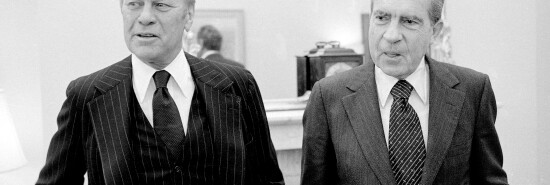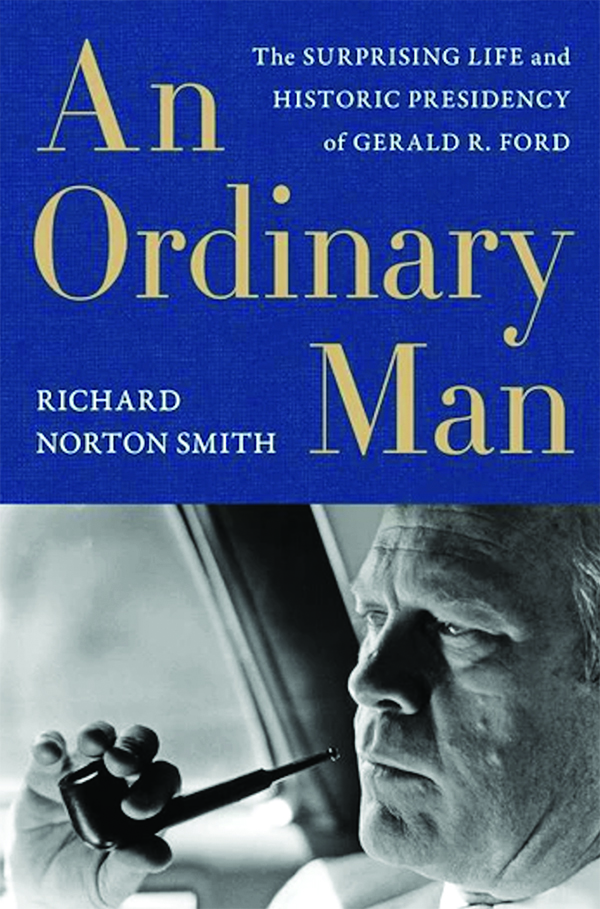
Gerald Ford reconsidered
Michael M. Rosen
Countless misperceptions, most of them grossly unfair, have calcified into what has become the conventional view of Gerald Ford.

A razor-sharp undergraduate at Michigan and a Yale-trained lawyer, Ford was mocked as an intellectual lightweight. A standout athlete on the University of Michigan’s national championship-winning football team, a coach and physical fitness trainer, an outstanding skier, and a survivor of two assassination attempts and a motorcade collision, Ford drew derision as a klutz for a single photographed stumble. A congressman who routinely won reelection by a 2-1 margin, who racked up significant legislative accomplishments over two decades in office and ascended to the position of House minority leader, Ford was lampooned as a political loser. And though he was a tireless bipartisan who joined the CIA oversight committee and the Warren Commission, Ford absorbed ridicule for being a partisan hack.
REVIEW OF KING: A LIFE BY JONATHAN EIG
In his absorbing, thorough, meticulously researched new biography of the 38th president, the prize-winning historian and presidential librarian Richard Norton Smith seeks to restore Ford’s reputation as a bright, honest, fair-minded public servant deeply undeserving of the scorn history has heaped upon him.
Born Leslie Lynch King Jr. in Grand Rapids, a middle-class Michigan town populated largely by Dutch immigrants, Ford was whisked away by his mother Dorothy to escape his abusive biological father two weeks after his birth in 1913. Dorothy remarried Gerald Ford Sr. shortly thereafter, and Lesley Jr. became Gerald Jr., growing up in the warm embrace of a stable family.
Young Gerald would later remember his mother as “the most selfless person I have ever known” and someone who made everyone else’s problems her own. Characterizing Dorothy as “spontaneous and empathetic,” Smith observes how she “set an example of broad-mindedness, implanting the generosity of spirit — critics called it naivete — that was to find ultimate expression in her son’s pardon of his White House predecessor.”
Ford lost the first (and, of course, the last) presidential election he ever ventured: He was defeated soundly by Bill Schuiling in his bid for senior class president at South High School, where he had excelled on the gridiron. Both the Great Depression and dedicated parenting nurtured a lifelong sense of frugality: After gaining admission to Michigan, Ford sold his own blood to pay the bills, and he paid his way through Yale Law School by coaching football on the side.
Following a stint as a Yellowstone Park ranger, an unsuccessful first marriage, and a dalliance with America Firsters, Ford shipped off to the Pacific after Pearl Harbor, where he served as a gunner on the USS Monterey. Once the war was won, Ford returned to Michigan, where, in 1947, he met, wooed, and wed Betty Bloomer, an exceptional dancer who, like Ford, had previously been briefly married.
In 1948, Ford sought and won his first office, ousting the incumbent congressman Barney Jonkman through hard work and a commitment to constituent service. Smith recounts how, the morning after the primary election, Ford “honored his pledge to a local farmer — win or lose, he had vowed to return after the primary and help the man milk his cows and scour his barns.”
In Washington, Ford cultivated relationships with Democrats and Republicans alike even as he gravitated toward the soon-to-be-elected Dwight Eisenhower and Richard Nixon, with whom he developed an almost instant rapport. Over several terms in Congress, he developed a characteristically thoroughgoing anti-communist demeanor, releasing a 1960 report that “offered unqualified support of Eisenhower’s Cold War stewardship.” Nixon even considered him as a running mate before settling on Henry Cabot Lodge.
Like a good Cold Warrior, Ford enthusiastically backed Presidents Kennedy and Johnson abroad while lambasting their social and economic policies at home. LBJ once quipped that if Ford “didn’t stop supporting my foreign policy so strongly, I’m going to wind up with a Republican Congress next year.” And amid GOP recriminations following LBJ’s landslide 1964 victory over Goldwater, Ford boldly and successfully challenged Indiana Rep. Charles Halleck for House minority leader, a post he would command for nearly nine years.
But when it became clear to Ford by 1973 that the prospect of a Republican congressional majority wasn’t soon going to materialize, he mused to Betty that “maybe it’s time for us to get out of politics and have another life.” He planned to retire in 1976.
And then twin lightning bolts struck: Watergate and Spiro Agnew’s resignation of the vice presidency in disgrace. Nixon tapped as a replacement the man he had unsuccessfully sought as a running mate five years earlier, and Ford gladly accepted, despite declaring that “I’m not promoting myself. I am not campaigning for it.” Ford’s elevation gained wide popularity, with 66% of Americans approving of his selection, and he easily won the support of his congressional colleagues: Only three senators and 35 representatives opposed him.
And here we arrive at Watergate, Nixon’s resignation, and Ford’s pardon of his predecessor, a dispiriting concatenation of events that both emblemized and doomed Ford’s presidency before it could even get off the ground. Even as he was settling into the vice presidency, Ford already had to navigate the treacherous shoals of missing recordings, calls for impeachment, and a harried and despondent president who sought succor from his No. 2. The excruciating summer of 1974 intensified the pressure on Ford, an upright man of integrity, to ensure justice was done without triggering a perception of the vice president forcing his way into the Oval Office.
But eventually, Nixon’s serial deceptions proved too weighty for Ford to bear, especially after the Supreme Court ordered the White House to turn over incriminating tapes. “The public interest,” he intoned, “is no longer served by repetition of my previously expressed belief that … the President is not guilty of impeachable offenses.” His next words, which Smith contends originated from speechwriter Milton Friedman (not the famed economist), would become much more famous: “My fellow Americans, our long national nightmare is over,” he declared in a demure inaugural address after Nixon at long last gave up the ghost.
Ford enjoyed a brief honeymoon as president, attaining a 71% approval rating. “We fell headlong in love with Gerald Ford in his first two weeks,” gushed Bob Schieffer of CBS News. His selection of Nelson Rockefeller as vice president pleased the broad center, despite alienating the Goldwater wing of the GOP and the far left.
Yet the issue of pardoning Nixon could not be avoided. Ford solicited advice from a wide range of sources that included Tip O’Neill, Henry Kissinger, legal scholars, the Rev. Billy Graham, and other clergymen. And on Sunday morning, Sept. 8, solemnly announcing his grave concern for “the immediate future of this great country,” Ford formally pardoned his predecessor of “all offenses against the United States.”
The pardon triggered immediate outrage, including from Ford’s press secretary, who tendered his resignation. Snap polls showed the public opposed clemency by a 2-1 margin, and Ford’s approval collapsed to 49%. Congress rebelled, denying him any legislative accomplishments of note, and the GOP was crushed two months later in the midterm elections. But Ford remained resolute in his decision, despite absorbing heavy criticism. “Nixon really f***ed up the pea patch,” Ford told a friend. “It will cost me the ’76 election, but I had to do it.”
Vietnam, too, loomed large in Ford’s short presidency. While Ford inherited from Nixon an impossible situation, he nevertheless shouldered blame when Saigon dramatically fell in April 1975.
The rest was history. A spirited primary challenge by Ronald Reagan divided the party and sapped Ford’s 1976 general campaign, and while Ford won the first debate against Jimmy Carter, the challenger held his own on the presidential stage. Carter never relinquished the polling lead he enjoyed. On Election Day, Ford lost narrowly, but immediately and admirably turned to transitioning power to Carter: “I’ve got to give him the White House in better shape than I got it,” Ford confided.
In his sole inaugural address, Ford acknowledged that voters had not “elected me as President by your ballots” but implored them “to confirm me with your prayers.” While popular opinion has not thus far favored Ford, Smith’s monumental biography will, one hopes, confirm his rightful place in history.
CLICK HERE TO READ MORE FROM THE WASHINGTON EXAMINER
Michael M. Rosen is an attorney and writer in Israel and a nonresident senior fellow at the American Enterprise Institute.
